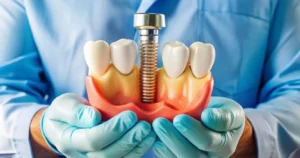Table of Contents
Are you suffering from tooth infections? Tooth infections can be painful and disruptive, often requiring immediate dental care. At Luth & Heideman Center for Dental Care, we specialize in diagnosing and treating these infections through effective root canal therapy in Las Vegas, NV. Knowing the causes, symptoms, & treatment choices will help you take control of your oral health.
What is a Tooth Infection?
A tooth infection, or a dental abscess, happens when bacteria invade the tooth’s inner layers, causing inflammation and infection. It often starts in the pulp—the soft tissue inside the tooth that has nerves & blood vessels. If left untreated, it can spread to neighboring tissues, causing severe pain and potentially life-threatening complications. This is where Root Canal Therapy in Las Vegas, NV, comes in to save your tooth and protect your health.
Common Tooth Infection Causes
1. Tooth Decay
Tooth decay is one of the most common reasons for root canals. When plaque builds up on the teeth and isn’t removed, it produces acid that erodes the enamel. Over time, this erosion can penetrate deep into the tooth, reaching the pulp and leading to an infection.
Tooth Decay and Root Canal
- Bacteria penetrate the enamel and dentin.
- The infection reaches the pulp chamber, causing inflammation.
- If untreated, the infection worsens, requiring a root canal to save the tooth.
2. Cracked or Chipped Teeth
A cracked or chipped tooth creates an entry point for bacteria to invade the tooth’s inner layers. Even a minor crack that isn’t visible can lead to infection. Trauma from accidents or grinding your teeth (bruxism) is often the culprit.
Why a Root Canal May Be Necessary
- Cracks allow bacteria to bypass the outer defenses of the tooth.
- The pulp becomes inflamed and infected.
- A root canal removes the infected tissue & restores the tooth’s integrity.
3. Recurring dental procedures
Multiple dental treatments can weaken a tooth over time, making it more vulnerable to infection. Crowns, large fillings, and other restorations may eventually compromise the pulp.
How Over-Treatment Can Lead to Root Canal Therapy
- The tooth’s structure becomes fragile.
- Microscopic openings allow bacteria to infiltrate.
- A root canal becomes necessary to eliminate the infection and preserve the tooth.
4. Gum Disease (Periodontitis)
Advanced gum disease can also cause tooth infections. Bacteria attacking the gums can create deep pockets around the tooth. The infection can reach the tooth’s root and pulp if left untreated.
Signs of Gum Disease-Related Tooth Infections
- Swollen, bleeding gums
- Receding gum line exposing the tooth’s root
- Chronic bad breath
- Tooth sensitivity and pain
Signs of a Tooth Infection
Recognizing the indications of a tooth infection is vital for prompt treatment. Some signs may seem mild at first but can quickly escalate if ignored.
Common Root Canal Infection Symptoms
- Severe Toothache: Persistent or throbbing pain that worsens over time.
- Sensitivity to Hot and Cold: Prolonged sensitivity, even after removing the stimulus.
- Swollen Gums: Swelling, tenderness, and redness around the infected tooth.
- Bad Taste or Odor: A foul taste or bad breath caused by the discharge from an abscess.
- Facial Swelling: In severe cases, swelling may spread to the face or neck.
- Fever and Fatigue: If the infection spreads, it can affect your health.
If you experience these symptoms, seeking immediate dental care is essential.
Why Root Canal Therapy is Necessary
When a tooth infection is detected, root canal therapy is often the best way to eliminate the disease and save the tooth. The infection can pass to other body parts without treatment, causing serious health risks.
How Root Canal Therapy Works
- Diagnosis and X-rays: The dentist examines your tooth & takes X-rays to figure out the extent of the infection.
- Anesthesia: Local anesthesia ensures a pain-free experience.
- Cleaning the Root Canal: The infected pulp is removed, & the inside of the tooth is thoroughly cleaned and disinfected.
- Sealing the Tooth: The tooth is filled & sealed to prevent future infections.
- Restoration: A crown is often used on the tooth to restore strength and function.
FAQ
1. When Do I Need a Root Canal?
Recognizing the signs of an infected tooth can prevent serious complications. If you’re experiencing any of the following symptoms, you may need a root canal:
- Persistent Tooth Pain: Severe, throbbing pain that doesn’t subside.
- Sensitivity to Hot and Cold: Pain lingers even after the hot or cold stimulus is gone.
- Gum Swelling and Tenderness: Infected teeth often cause surrounding gums to swell and become sensitive.
- Tooth Discoloration: A darkened tooth may indicate damage to the inner pulp.
- Abscess or Pus Formation: Visible pimples or abscesses on the gums are signs of severe infection.
- Pain While Chewing or Biting: Increased pressure on an infected tooth can cause sharp pain.
If you experience one or more of these symptoms, it’s time to consult a dental professional to avoid worsening the condition.
2. Do You Always Need a Root Canal for Tooth Pain?
Not all tooth pain requires root canal therapy. Tooth sensitivity or gum pain can sometimes result from reversible conditions such as mild cavities, gum recession, or sinus infections. That’s why consulting with an experienced dentist for a proper diagnosis is crucial.
3. Is a Root Canal Painful?
Many people fear root canals since they assume the procedure will be painful. Root canal therapy is developed to relieve pain, not cause it. Thanks to modern dental advancements and local anesthesia, most patients report minor discomfort during the procedure, similar to getting a standard filling.
Post-procedure, you may experience mild soreness for a day or two, usually relieved with over-the-counter pain relievers.
4. What Happens If You Don’t Get a Root Canal?
Ignoring an infected tooth leads to serious complications, including:
- Abscess Formation: A painful pocket of pus can form at the tooth’s root.
- Bone Loss: The infection can damage the surrounding bone.
- Tooth Loss: The tooth may become too damaged to save.
- Systemic Infection: In some cases, the infection can move to other body parts, causing serious health risks.
Delaying treatment can result in the need for more extensive—and expensive—procedures later on.
5. Why Choose Luth & Heideman Center for Dental Care?
At Luth & Heideman Center for Dental Care, we combine expertise, advanced technology, & compassionate care to ensure our patients receive the best possible outcomes. Our experienced team takes the time to listen to your concerns & create a personalized treatment plan tailored to your needs. Whether you need a root canal or other dental services, we’re here to help you achieve lasting oral health in a comfortable, stress-free environment.
Consult a Professional
A tooth infection can be painful and serious, but with prompt care, you can protect your oral health and keep your smile intact. Understanding the common causes and symptoms of tooth infections helps you stay proactive in preventing them. If you’re experiencing any signs of a tooth infection, it’s time to act. Contact Luth & Heideman Center for Dental Care today. We can help you find relief and restore your oral health.
Takeaway
At Luth & Heideman Center for Dental Care, your comfort & oral health are our top priorities. We understand how stressful dental issues like tooth infections and decay can be, so we offer expert root canal therapy to relieve pain and restore your smile. Ignoring tooth pain can lead to more serious complications—don’t wait until it becomes an emergency. Stop the pain before it gets worse! Call us today to discuss your treatment options.






